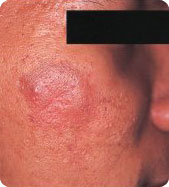Laser treatment is generally safe. Some procedures, such as laser treatment for scars and wrinkles carry higher risk for side effects compared to other laser treatments. Some of the potential side effects include:
1. Redness of skin after treatment.
This is usually transient and resolves within months.
2. Hyperpigmentation (darkening of skin).
This can be minimised by sun avoidance both pre-operative and post-operatively. It can also be treated with sunscreens or bleaching agents. It usually fades with time.

3. Hypopigmentation (lightening of skin).
This is less common but will improve with time as well.

4. Scarring.
This is extremely rare if all the necessary precautions are taken. It usually occurs secondary to wound infection during the healing phase after laser surgery. Good wound care after laser surgery can help to reduce the risk of scarring.